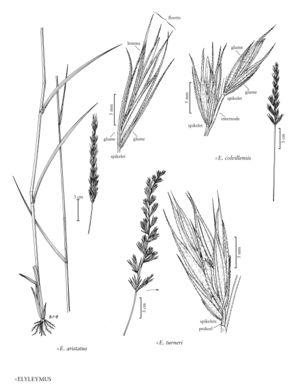Difference between revisions of "×elyleymus aristatus"
FNA>Volume Importer |
FNA>Volume Importer |
(No difference)
| |
Revision as of 19:15, 24 September 2019
Plants not or shortly rhizomatous. Culms 60-130 cm, glabrous. Leaves evenly distributed on the culms; sheaths smooth, glabrous; auricles poorly developed, to 0.5 mm; ligules 1-2.5 mm, scarious, rounded; blades about 5.5 mm wide, abaxial surfaces glabrous, mostly smooth, scabrous near the margins, adaxial surfaces scabridulous, primary veins separated by about 3 secondary veins. Inflorescences spikes, 6-15 cm long, 10-15 mm wide including the awns, 7-10 mm wide excluding the awns, erect, with 2-3 sessile or subsessile spikelets per node; internodes 4-7 mm, concealed by the spikelets; disarticulation tardy, in the rachises and beneath the florets. Spikelets 10-20 mm excluding the awns, to 18 mm including the awns, with 3-4 florets. Glumes 8-15 mm long, 0.3-0.5 mm wide, subequal to unequal, scabrous; lemmas 7.5-12 mm, glabrous, smooth or scabrous, sometimes only scabrous distally, midveins prominent and scabrous distally, awns 4-5 mm; anthers 2.2-2.4 mm.
Distribution
Colo., Wash., Calif., Oreg., Wyo., Idaho, Nev.
Discussion
Dewey and Holmgren (1962) argued that ×Elyleymus aristatus comprises hybrids between Elymus elymoides and Leymus cinereus or L. triticoides. It has been found at many locations where the parents are sympatric.
Selected References
None.
